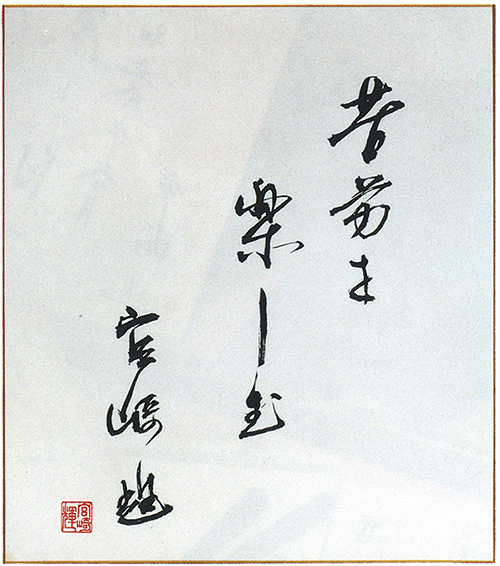I have overseen the launch of very many different businesses over the years. Although each one posed a series of challenges, they somehow all worked out thanks to the outstanding efforts of our employees. I am truly grateful to all of them.
Whenever we launch a new business, the first thing I think about is who to put in charge. It’s said that “business is people,” and I believe personnel allocation is critical to the success of any business.
When we launched the “three new businesses,” I selected labor affairs experts (the late) Makoto Muramoto and Yoshihisa Kuroda (former vice president) to head the Nylon Division and the Construction Materials Division, respectively, and experienced researcher Yuji Kobayashi (current Chairman of Chori) to head the Synthetic Rubber Division. None of them had any experience in sales, but they all lived up to my expectations.
When we started the homes business in 1972, I chose the young and energetic Keita Tsuzuki (current vice chairman) to head the division, and as his successor I chose Nobuo Yamaguchi (current vice president), who had spent many years in General Affairs and Secretarial Affairs. The two of them grew homes into a major pillar of business for Asahi Kasei.
As I allocated personnel across entirely different fields, the media would sometimes write about it as “surprising personnel choices.” On the surface, it may seem that way. But a truly skilled labor affairs manager may also be able to handle sales, and a competent salesperson may also be good at administration. What matters is a person’s capacity. Some people are ill-equipped to take on different responsibilities, so we need to place them in their respective suitable areas. An important role for a leader is to discern people’s abilities.
A new president will replace me at some point. The most important conditions for my successor are exceptional capacity and sincerity. Of course, a leader also needs other qualities such as health, vitality, experience, and a sense of responsibility, but in the end it boils down to capacity. The position of president requires a capacity for comprehensive judgment and decision-making which is far above that of vice-president or other senior positions.
When deciding on a successor to be president of a company, it’s important to consider whether that person will allow the company to work together as a whole. The circumstances differ from company to company, but the president can’t run a company alone. The president needs to be able to get all the human resources working together.
Consider the case of a physician to illustrate the position of a company president. It would be like having a doctor who served as a university professor while holding a general practice in the countryside at the same time. The person would need to have both deep specialized knowledge and training as well as the practical ability to differentiate between and diagnose a wide variety of conditions.
It’s also important to have a spirit of enjoying hard work. “Enjoy challenges” is my favorite motto, and I have it framed on the wall of my office. Business is always accompanied by hardship. There’s never success without hard work. But the harder the struggle, the more rewarding it feels when you overcome everything and accomplish your goal. Of course, a new set of problems is bound to come up before long. This cycle seems to constantly repeat.
This isn’t only true for leaders, but something that everybody who works in business will encounter. Nevertheless, leaders need to have this spirit more than others. In my case, the more difficult the problems I encounter are, the stronger my drive to solve them becomes. A hard struggle doesn’t mean suffering. It took about 10 years for me to see it this way.
People can keep learning new things their entire life. I would rather keep on using my mind than idly while away my days. I intend to continue learning more and more.
 Japanese calligraphy written about Miyazaki's favorite motto
Japanese calligraphy written about Miyazaki's favorite motto
“Enjoy challenges” by his own.

